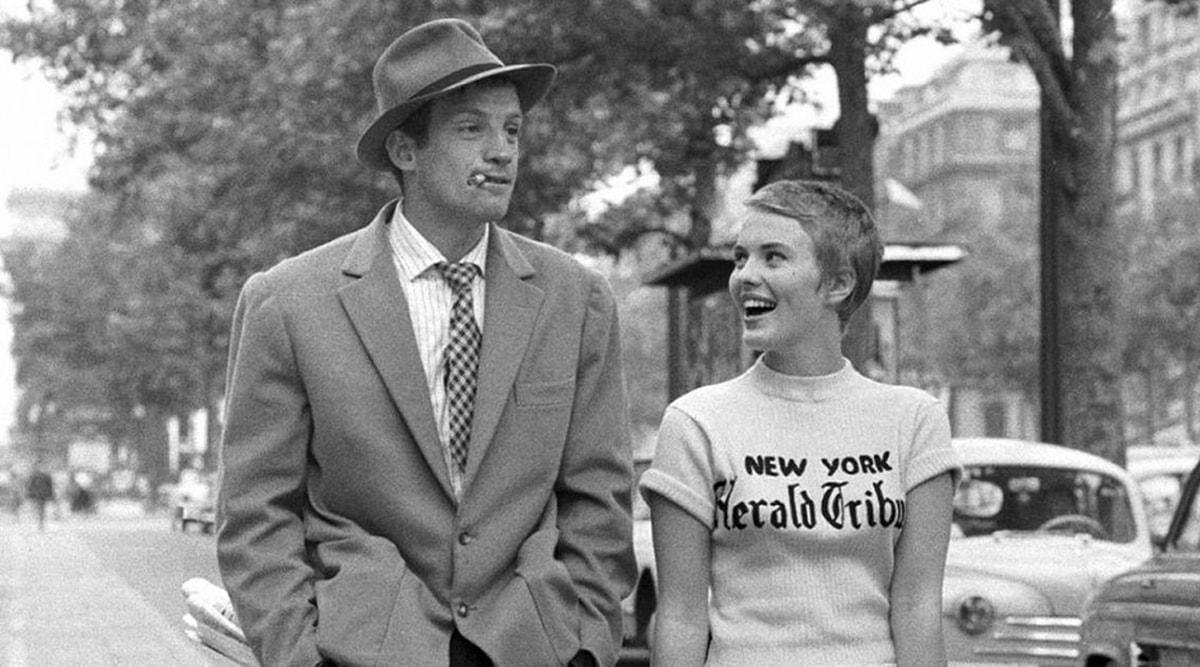 Godard attempted an unconventional way of cutting through shots in Breathless.
Godard attempted an unconventional way of cutting through shots in Breathless.Written by Appu Bhattathiri
Jump cuts. Breathless. Godard. This is the sequence with which I could process the man, Jean-Luc Godard. It might be because of the countless hours spent at the editing table that I remember the jump cuts in Godard’s Breathless rather than the French New Wave or other significant things the man is credited with. Though jump cuts could claim to exist much earlier, Jean-Luc, who decided to attempt the most unconventional way of cutting through shots at Jean-Pierre Melville’s suggestion in Breathless, makes it one of the most influential films made after Citizen Kane.
As fresh as yesterday in my mind is the image of Godard — holding a cigar in one hand and displaying his open palm at the camera — during last year’s International Film Festival of Kerala, where he delivered his Lifetime Achievement Award acceptance speech (on a video call.) This could also be the most vivid image of the man that many cinephiles in Kerala might have had in their minds until September 13. As news of Godard’s demise broke, the feeds of our social media handles were flooded with quotes, write-ups, pictures and videos, all signifying our love for a legend.
In that flood, one old interview of Jean-Luc Godard with Dick Cavett had my attention. In the video, the interviewer says to Godard, “There are no scripts for your movies.” To which Godard replies: “There are, but not the way you are doing it here.” Right after which, he takes out two tiny notepads and says those are the scripts for his next two films.
Proceeding to shoot a film without a tight-bound script, to write parts of the screenplay just hours before shooting and providing the lines to his actors only on the location: this might indeed have created some unease among a few of his cast and crew at least but the spontaneity and documentary-like quality to the narrative that Godard achieved here had to do almost entirely with this method. Maybe, all he was trying to do was create a genuine and honest image.
Godard has said that photography is truth, and that cinema is truth 24 times per second. He also told the world that every edit is a lie. This battle between truth and lies might be what we see in his films.
The peculiar voiceovers and the abstract imagery can also be attributed to the Godard I know. From black and white to colour, to film, digital and stereoscopic 3D, his language in cinema is hard to explain, though to feel and experience would be a treat. His segment in the anthology 3x3D and Goodbye to Language 3D uses the language of cinema like no one has dared. It remains an experience that could perhaps never be recreated by anyone, before or after. It works on the simplicity and sophistication all at the same time to a level where it is not the conventional plot that moves forward but images. Watching these films at the screenings of the different international film festivals held in India is in itself an exceptional feeling. Even today, I can recall sitting amidst generations of Godard film lovers and leaving with a shared experience.
After years of watching Godard films on DVD’s, DVDrips and film festivals, came a film by Michel Hazanavicius. Godard Mon Amour (Redoubtable), a film on the man himself based on the book written by Anne Wiazemsky, his ex-wife. It imitated the Godard-ian style of films from the late 60s in trend though the narrative held a comic twist. Godard, who was still going strong at the time, is heard to have called the film a “stupid, stupid idea”, which the makers of the film quoted on their poster. But what isn’t funny anymore is Louis Garrel, who played Jean-Luc Godard in Redoubtable, looking at the camera and saying “Godard is dead”.
To conclude this writing without mentioning another Godard that I know in person would be incomplete. He isn’t a filmmaker but a scientist whose father, T P Nazar, remains a devoted fan of Godard. His younger brother, who is also named after a celebrated filmmaker, is an up-and-coming Malayalam director, Fellini (who is a friend with whom I have collaborated with in making movies). There needn’t be more proof to how Godard has and will continue to influence the lives of people in places we live in, miles and miles away from 7th arrondissement.
The writer is an award-winning Malayalam film editor and director